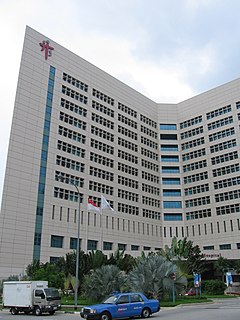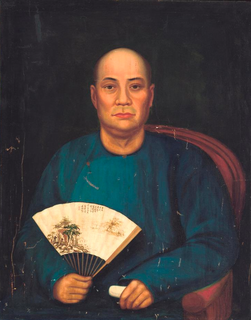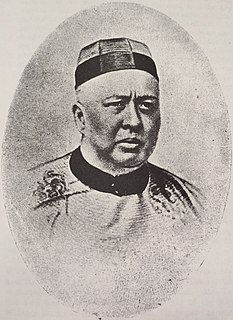Related Research Articles

Tan Tock Seng Hospital is a tertiary referral hospital in Singapore, located in Novena. The hospital has 45 clinical and allied health departments, 16 specialist centres and is powered by more than 8,000 healthcare staff. Tan Tock Seng Hospital is Singapore’s second largest acute care general hospital with over 1,500 beds. TTSH has the busiest trauma centre in the country; 100 trauma cases are seen every day and 100 trauma surgeries are performed daily.

The Ghee Hin Kongsi was a secret society in Singapore and Malaya, formed in 1820. Ghee Hin literally means "the rise of righteousness" in Chinese and was part of the Hongmen overseas network. The Ghee Hin often fought against the Hakka-dominated Hai San secret society.

Tan Kim Seng, was a prominent Peranakan merchant and philanthropist in Singapore in the 18th century.

Tan Kim Ching, also known as Tan Kim Cheng, was a Chinese politician and businessman. He was the eldest of the three sons of Tan Tock Seng, the founder and financier of Tan Tock Seng Hospital. He was consul for Japan, Thailand and Russia, and was a member of the Royal Court of Siam. He was one of Singapore's leading Chinese merchants and was one of its richest men in Singapore at that time. He was also the first Asian member of the Straits Branch of the Royal Asiatic Society. After his father, Tan Tock Seng's death, he became the Kapitan Cina of the Straits Chinese community. He is believed to have been the head of the Triad in Malaya.

The National Healthcare Group (NHG) is a group of healthcare institutions in Singapore. The group was formed in 2000 and operates several hospitals, national specialty centres, and polyclinics. Tan Tock Seng Hospital is the largest hospital in the group and serves as the flagship hospital for the cluster.
Gan Eng Seng was a Chinese businessman and philanthropist who was one of the early pioneers of Singapore. He is known for his generosity to many charitable causes in Malaya and Singapore during the British colonial era. Some of his most recognised contributions were the setting up of Gan Eng Seng School, the Thong Chai Medical Institution, Tan Tock Seng Hospital, and the Ee Hoe Hean Club.

Tan Teck Guan Building is a historic building on College Road, within the compound of Singapore General Hospital in Bukit Merah, Singapore. The building currently houses offices of the Ministry of Health.
Dr. M. K. Rajakumar was a Malaysian doctor and socialist politician. As a doctor, he was a pioneer of the discipline of Family Medicine by general practitioners in Malaysia. As a leftist intellectual he was among the leaders of the Labour Party of Malaya and Barisan Sosialis in the 1960s, helping to build the Labour Party alongside Tan Chee Khoon, V. David and Ishak Haji Muhammad.

Sarawak General Hospital is the largest hospital in the state of Sarawak, Malaysia. It is the main tertiary and referral hospital in East Malaysia. In its earlier years it was known as Kuching General Hospital.

Tan Chorh Chuan is a Singaporean college administrator and professor who served as the second president of the National University of Singapore between 2008 and 2017. He is currently a professor at the National University of Singapore.

Cadi Scientific is a Singapore-based healthcare technology company that develops and markets wireless sensing and tracking devices base on active Radio-frequency identification (RFID) technology for healthcare institutions. Cadi Scientific is known in the Singapore Healthcare market for its Cadi SmartSense System that is designed for tracking patients' real-time locations for automating workflow as well as monitoring patients' temperatures automatically to reduce nurses' workload.
The Yong Loo Lin School of Medicine, established in 1905, is the first institution of higher learning in Singapore and the genesis of the National University of Singapore. The School is one of many who offer medical programmes in the Asia Pacific region. The Times Higher Education World University Rankings 2019 by subject and Quacquarelli Symonds (QS) World University Rankings by Subject 2019 list NUS Medicine as the leading medical school in Asia. Its distinguished alumni include cabinet ministers of Singapore, well-known doctors and a Prime Minister of Malaysia.
Gurumukh Sajanmal Sainani is an Indian general physician, medical researcher, medical writer and an Emeritus Professor of the National Academy of Medical Sciences. He is a former director of the All India Heart Foundation and the incumbent director of Jaslok Hospital, Mumbai. He is a recipient of the highest Indian award in the medical category, Dr. B. C. Roy Award, from the Medical Council of India and the rank of Honorary Brigadier from the President of India. The Government of India awarded him the fourth highest civilian award of the Padma Shri in 2000.
Raman Viswanathan (1899–1982) was an Indian chest physician, medical mycologist and pulmonologist, considered by many as the father of Chest Medicine in India. He was the founder director of Vallabhbhai Patel Chest Institute, a postgraduate medical institute based in Delhi. An elected fellow of the American College of Chest Physicians, Royal College of Physicians of London, Indian National Science Academy and the Academy of Medical Sciences, United Kingdom, he was a recipient of several honors including the Forlanini Medal by Italian Tuberculosis Association and the Eugeno Morelli Prize of the National Academy of Sciences, Italy. The Government of India awarded him the third highest civilian honour of the Padma Bhushan, in 1974, for his contributions to medicine.
David Todd was a Hong Kong haematologist, the founding president of the Hong Kong College of Physicians and the Hong Kong Academy of Medicine. He was best known for transforming medical education and training in Hong Kong.
The Lee Kong Chian School of Medicine is the medical school of the Nanyang Technological University. The school was established in 2013 as Singapore's third medical school, after the Yong Loo Lin School of Medicine and the Duke–NUS Medical School. It is a collaboration between Nanyang Technological University and Imperial College London.

Ernest Steven MonteiroBBM PJG FRFPS was a Singaporean physician, specialised in preventive medicine. He also served as the Singapore Ambassador to Brazil, Cambodia and the United States.

The Faculty of Medicine, University of Malaya is one of the thirteen faculties of the University of Malaya (UM). It was officially established in September 1962 after the establishment of the university's Kuala Lumpur campus; it was the first medical school established in Malaysia.

Maggie Lim was a Singaporean physician and public health official. She was inducted into the Singapore Women's Hall of Fame posthumously, in 2014.
James Mark Jeyasebasingam Supramaniam was a doctor, public administrator, research clinician and the first Chairman of the Singapore Medical Research Council, WHO Fellow, and acknowledged world expert on tuberculosis, with Sir John Crofton and Wallace Fox.
References
- Staff Achievements - Tan Tock Seng Hospital
- Chang Ai-Lien (26 April 2010). "A will to heal". The Straits Times (Singapore).